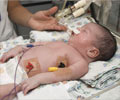Use of parentese demonstrated the increase in children's later language skills as well as conversational abilities.

‘Those in the coaching group learned more about the cognitive and social benefits of parentese, when and how to use it to promote interaction with their child, and the positive effects that parentese could have on their child's language development.’





But if parents knew the way they speak could help baby learn, would they alter their speech?A new study from the Institute for Learning & Brain Sciences, or I-LABS, at the University of Washington suggests they would, to baby's benefit.
Researchers examined how parent coaching about the value of parentese affected adults' use of it with their own infants, and demonstrated that increases in the use of parentese enhanced children's later language skills.
The study, published online Feb. 3 in the Proceedings of the National Academy of Sciences, finds that parents who participated in individual coaching sessions used parentese more often than control-group parents who were not coached, and that coaching produced more parent-child "conversational turns" and increased the child's language skills months later.
"We've known for some time that the use of parentese is associated with improved language outcomes," said Patricia Kuhl, I-LABS co-director and professor of speech and hearing sciences at the UW. "But we didn't know why. We believe parentese makes language learning easier because of its simpler linguistic structure and exaggerated sounds. But this new work suggests a more fundamental reason.
Advertisement
Parentese is not what is often called "baby talk," which is generally a mash-up of silly sounds and nonsense words. Instead, it is fully grammatical speech that involves real words, elongated vowels and exaggerated tones of voice. Spoken directly to the child, it sounds happy and engaged, and helps infants tune in socially to their parents and respond, even if only through babbling.
Advertisement
The new study focuses on the long-term outcomes of parent coaching and how it led to changes in the parents' language, in parent-child conversation, and eventually, in the child's speech at 18 months.
"We had no idea that parents would respond so positively to information about how their own speech to the child affects the child's language development. Parent coaching gave parents a measurement tool, almost like a Fitbit for parentese, and it worked," said lead author Naja Ferjan Ramírez, a UW assistant professor of linguistics.
To assess child language output, all families in the study were given a lightweight recorder, which the child wore in a specially designed vest during four separate weekends at ages 6, 10, 14 and 18 months. The device recorded both parent and infant speech over the entirety of two consecutive days, so that researchers could measure parents' use of parentese, parent-child conversational turns, as well as infant language production -- either babbling or actual words. Parent coaching sessions occurred at 6, 10 and 14 months.
For the 48 families randomly assigned to receive coaching, the sessions provided guidance and feedback on specific communication strategies, such as using parentese, speaking directly to the child and engaging the child in back-and-forth exchanges known as conversational turns.
In reviewing recordings with parents, researchers played back recordings of parents' language behaviors and measured them against research-based targets for child language development. Parents were encouraged to include language as part of daily routines and were given language-interaction tips in the form of cards with "brain building" tips from Vroom, a program of the Bezos Family Foundation.
All parents in the study already used parentese at the beginning of the project, but their use varied greatly, the researchers said. Those in the coaching group learned more about the cognitive and social benefits of parentese, when and how to use it to promote interaction with their child, and the positive effects that parentese could have on their child's language development.
The results show that parent coaching resulted in an increased use of parentese and infant vocalizations that continued to grow after the end of the parent coaching sessions. Between 14- and 18-months, coached families showed a drastic jump in conversational turn-taking and child vocalizations. Children of coached parents produced real words -- such as "banana" or "milk" -- at almost twice the frequency of children whose parents were in the control group. Parent surveys estimated that the children's 18-month vocabulary averaged around 100 words among children of coached families, compared to 60 words among children in the control group.
"We know that language skills in infancy predict subsequent stages in language development, so enhancements in language behaviors in infancy could therefore have cascading effects on speech development over time," said Ferjan Ramírez.
Kuhl added, "Language evolved to facilitate the social communication skills that are essential for survival of the species. In this study, we observe firsthand how parents' language and social engagement can promote baby's initial responsive coos, which become words, and then sentences -- educating infants in the art of human communication."
Source-Eurekalert











